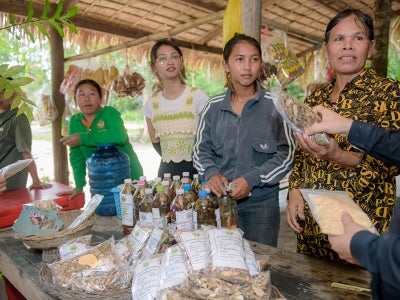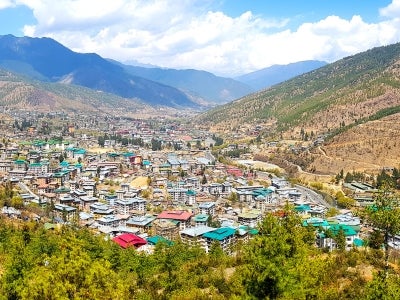

Phib Raini Limbu is all smiles and has every reason to be. She lives in a small Bhutanese mountain village devoted to growing a little cardamom and ginger as cash crops, with maize, paddy and millet offering subsistence supplemented by a few livestock, mainly cattle and goats. Dzedhokha (pop 2,672), like thousands of other communities in this largely rural kingdom, is off the beaten track; it has only one access farm road, mostly impassable during the monsoon season but Phib is all smiles. Why? It is because the world is now beating a path to Dzedhoka’s door and with it a world of opportunities has arrived.
Among its assets the Dzedhokha area boasts a wealth of natural resources most noteworthy being plants. Using the Traditional Knowledge (TK) which the people, plants are made into powders, decoctions, syrups and pastes to treat a variety of ailments in the village, such as jaundice, food poisoning, bone fracture and dislocation, typhoid, diabetes, snakebite, cuts, etc. Of the many plant species used for treatment, Zingiber cassumunar is particularly favoured locally for alleviating joint pain.

Recognizing the presence of such an important TK in the locality, Bhutan’s National Biodiversity Center (NBC) has identified Lokchina administrative district which includes the village as one of the pilot sites under the project on “Implementing the Nagoya Protocol on Access to Genetic Resources and Benefit Sharing in Bhutan”, supported by Japan’s Nagoya Protocol Implementation Fund (NPIF), Global Environment Facility (GEF) and United Nations Development Programme (UNDP). The project aims to ensure that TK holder like Phib and her fellow villagers can benefit from use of their TK related to use of the genetic resources which the plants have, when they are used for commercial product development. The project also supports establishment of a national Access and Benefit Sharing (ABS) framework, to facilitate the discovery of nature-based products and demonstrate best practices of ABS processes by engaging communities and seeking their prior informed consent. For locals to benefit and have a voice, local involvement is, of course, essential – which brings us back to Phib and her smiles.
Phib has just been elected the Secretary of the village farmers’ group comprising 21 women and 17 men. The farmers’ group was registered formally through a bylaw on 30th April 2015. As the Secretary, Phib has to play an important role in group management and decision making and in the process of equitable collaboration with multinational pharmaceutical interests and other partners.
Skills and knowledge training is very much part of the project’s focus and Phib, as well as her friends, have received awareness education on the importance of preserving TK, the significance of ABS and the possible benefits local people will accrue from bio exploration of their genetic resources. Following an initial workshop, farmers were trained on Zingiber cassumunar cultivation techniques and given hands on training in field preparation, irrigation, manure application, weeding, harvesting and post-harvest techniques. “I was extremely impressed by farmers’ enthusiasm in the entire training process,” says Leki Wangdi, Biodiversity Supervisor of NBC.
NBC will partner with the Swiss based Quantum Pharmaceuticals Limited for collaborative research aimed at confirming TK claims of relieving joint pains using extracts from the plant. The research will involve bio-activity tests and evaluations of the safety, quality and efficacy of the target bio-product with a view to trial product development and ultimately international distribution.

Based on the results of the collaborative research, the initiative will lead to a community-private-government tri-partite ABS agreement involving the local communities from where the TK and genetic resources are sourced, the international collaborator and NBC. The ABS agreements will articulate the objectives of the collaboration, roles, rights and responsibilities of all the parties, mutually agreed terms for access to genetic resources and benefit sharing between providers and users of the genetic resources and associated traditional knowledge.
Through such initiative, farmers like Phib will have better opportunities to prosper from their traditional knowledge of biological resources and the capacity enhancement through the project will prepare them for better negotiation of associated benefits from government and private companies. Through such intervention, they will also participate proactively in conservation and sustainable use of Bhutan’s rich biological and genetic resources. Remote? Yes. Small? Yes? But this initiative places Dzedhoka very definitely on the map. And that is something for us all to smile about.
Story by Tashi Dorji, a Programme Analyst at UNDP Bhutan Country Office. For more information on the project, please visit www.bt.undp.org


